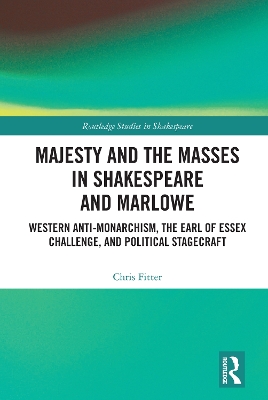Routledge Studies in Shakespeare
2 total works
This book argues that Shakespeare was permanently preoccupied with the brutality, corruption, and ultimate groundlessness of the political order of his state, and that the impact of original Tudor censorship, supplemented by the relatively depoliticizing aesthetic traditions of later centuries, have together obscured the consistent subversiveness of his work. Traditionally, Shakespeare's political attitudes have been construed either as primarily conservative, or as essays in richly imaginative ambiguation, irreducible to settled viewpoints. Fitter contends that government censorship forced superficial acquiescence upon Shakespeare in establishment ideologies - monarchic, aristocratic and patriarchal - that were enunciated through rhetorical set pieces, but that Shakespeare the dramatist learned from Shakespeare the actor a variety of creative methods for sabotaging those perspectives in performance in the public theatres. Using historical contextualizations and recuperation of original performance values, the book argues that Shakespeare emerged as a radical writer not in middle age with King Lear and Coriolanus - plays whose radicalism is becoming widely recognized - but from his outset, with Henry VI and Taming of the Shrew. Recognizing Shakespeare's allusiveness to 1590s controversies and dissident thought, and recovering the subtextual politics of Shakespeare's distinctive stagecraft reveals populist, at times even radical meaning and a substantially new, and astonishingly interventionist, Shakespeare.
This book is a landmark study of Shakespeare’s politics as revealed in his later History Plays. It offers the first ever survey of anti-monarchism in Western literature, history and philosophy, tracked from Hesiod and Homer through to contemporaries of Shakespeare such as George Buchanan and the authors of the Mirror for Magistrates, thus demonstrating that anxiety over monarchic power, and contemptuous demolitions of kingship as a disastrously irrational institution, formed an important and irremovable body of reflection in prestigious Western writing. Overturning the widespread assumption that "Elizabethans believed in divine right monarchy", it exposits the anti-monarchic critique built into Shakespeare’s Histories and Marlowe’s Massacre at Paris, in five chapters of close literary critical readings, paying innovative attention to performance values.
Part Two focuses Queen Elizabeth’s principal challenger for national rule: the Earl of Essex, England’s most popular man. It demonstrates from detailed readings that, far from being an admirer of the war-crazed, unstable, bi-polar Essex, as is regularly asserted, Shakespeare launched in Richard II and Henry IV a campaign to puncture the reputation of the great earl, exposing him as a Machiavel seeking Elizabeth’s throne. Shakespeare emerges as a humane and clear-sighted critic of the follies intrinsic to dynastic monarchy: yet hostile, likewise, to the rash militarist, Essex, who would fling England into permanent war against Spain.
Founded on an unprecedented and wide-ranging study of anti-monarchist thought, this book presents a significant contribution to Shakespeare and Marlowe criticism, studies of Tudor England, and the history of ideas.

